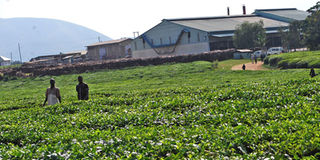Tea farmers ask govt for regulatory authority

Farmers walk through a tea plantation near Kayonza Growers Tea Factory in Kanungu District in 2015. PHOTO/ALFRED TUMUSHABE
What you need to know:
- The chairperson of south-western Uganda tea farmers and tea nursery bed operators association, Mr Frank Byaruhanga, said the cash crop has been embraced by hundreds of farmers, which calls for improved management.
Tea farmers and leaders in Kigezi are advocating the establishment of a tea regulatory authority to ensure quality production and better prices, especially in the international market.
The chairperson of south-western Uganda tea farmers and tea nursery bed operators association, Mr Frank Byaruhanga, said the cash crop has been embraced by hundreds of farmers, which calls for improved management.
Mr Byaruhanga said there are 26,684 tea growers in the region. Kigezi now has eight tea processing factories from one in 2008.
Kanungu alone has six factories while Kabale and Kisoro each have one.
There are six tea processing factories in greater Bushenyi, bringing the total to 14 in south-western Uganda.
The districts where tea is grown are Kabale, Kanungu, Kisoro, Rukiga, Rubanda, Ntungamo, Rukungiri, Rwampara, Buhweju, Bushenyi, Rubirizi, Sheema, Mbarara and Mitooma.
“In 2008, tea farmers in Kanungu District were earning Shs8.7 billion from selling green tea leaves but in 2020 they earned Shs55 billion because of massive production. If government can consider the establishment of a tea regulatory authority, this would put control measures that will result into quality tea leaf production that will in turn fetch high prices at the international markets where Ugandan tea is auctioned,” Mr Byaruhanga said.
The chairperson of Kabale tea growers, Mr Philip Zikampereza, said the regulatory authority would solve most challenges the sector is facing.
“Once a tea regulatory authority is put in place, bureaucracies that are currently affecting tea farmers ranging from delayed payments of supplied tea seedlings and poor farming methods due to lack of the required inputs like fertilisers will be history, ” Mr Zikampereza said.
The Kisoro District chairperson, Mr Abel Bizimana, said every popular cash crop should have a regulatory authority for quality control and assurance since production is for both local and international markets.
“The issue of operating tea enterprise in Uganda on mere guidelines should stop because under this arrangement, everybody becomes a manager of the enterprise and at the end there is no one responsible,” Mr Bizimana said.
The Rukiga District vice chairperson, Mr Michael Mbareba, said the tea enterprise has no home as it currently lies between the National Agriculture and Advisory Services (Naads) and the Ministry of Agriculture.
The MP for Kinkizi West, Mr James Kaberuka, yesterday said the tea sector has for long largely thrived on its own with minimal involvement of government.
“The farmers are right, we need to have Uganda Tea Authority. Farmers are on their own, they don’t have adequate advisory, they are relying on generic knowledge. The authority will help control inputs, quality improvement and marketing. Government has reaped much from the tea export with less input in quality improvement and marketing,” Mr Kaberuka said.
The minister of Agriculture, Mr Vincent Ssempijja, did not pick our repeated calls yesterday.
Farmers demand pay
Meanwhile, 718 tea nursery bed operators in Kigezi are demanding payment of Shs143 billion from government for supplying tea seedlings to farmers in 2015, 2016 and 2017.
They had in 2018 sued government in the commercial court in Kampala. However, the case was withdrawn in January and the two parties signed a consent judgment that government pays nursery bed operators in a phased manner with the first amount of Shs15 billion expected in February. The money has not yet been paid.
Mr Byaruhanga yesterday said together with the lawyer for nursery bed operators, Mr Patrick Kiconco, they met the President in Entebbe on Saturday (March 27) over the matter.
He said the meeting was also attended by Prime Minister Ruhakana Rugunda, former Prime Minister Amama Mbabazi, the Attorney General, Naads executive director and State minister for Finance David Bahati.
“The commitment made earlier was not being honoured; we met the President and it was resolved that government pays us Shs 67 billion for supplied tea seedlings that have been verified. It was resolved that the remaining tea seedlings be verified in a short time and payment made,” Mr Byaruhanga said.




